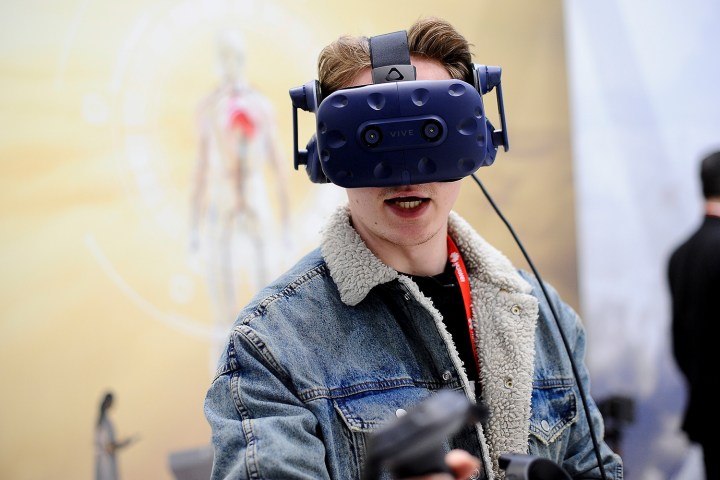Steven Spielberg’s movie adaptation of Ready Player One is introducing virtual reality (VR) to a whole new audience. But while Ready Player One is set in 2044, here in 2018 VR is capable of some pretty darn exciting things. Here are eight amazing ways that virtual reality is being used right now.
Gaming

Gaming is the most prominent application for VR right now — not that, to quote Seinfeld, there’s anything wrong with that. The VR gaming industry earned an estimated $286.7 million last year, according to SuperData Research, and that number may grow to $2.3 billion industry by 2020.
Factor in the growing number of headsets and some pretty darn impressive immersive haptic technology research and you have VR’s most exciting use-case here in 2018.
Surgery

Don’t be surprised if the surgeons of the future are more about VR than ER. Virtual reality could be a handy tool for not just training the surgeons of tomorrow, but actually helping them carry out their jobs too.
The company Fundamental VR is busy developing VR scenarios which allow trainee surgeons to carry out virtual operations using haptic controls. These controls simulate what it’s actually like to perform procedures like sleeve gastrectomies without the whole, you know, risk of actually cutting into a human being.
Just as potentially transformative is work being carried out by an orthopaedic surgeon in Santa Catarina, Brazil, who is using augmented reality tech to help him perform spinal surgery in a safe and affordable manner. With the rise of medical robots capable of performing procedures without the risk of shaky hands, we can’t help but think that surgical VR may have an application here, too.
Live events
Imagine being able to get the best seat in the house at the hottest sold out Broadway play, visit all the top museums in the world without spending a dime on travel, or soak up the live experience at every sports game in a season.
All three of these scenarios have already been investigated by forward-looking organizations. Ten years from now, this will be standard fare.
Collaboration
Slack is about as thrilling as workplace collaboration tech tools get, but VR could offer a more exciting next step. Using VR, teams who are distributed around the world can log in to the same virtual space to work together on projects. That’s the basis for an existing VR collaboration solution called Vizible from the company WorldViz.
It’s already been used by the footwear designer Deckers, who have utilized it to work together on designing new shoes. Whether you’re a graphic designer or an architect, the ability to be in the same “room” as clients or colleagues could be a game changer.
Therapy
The ability to allow a person to face their fears in a safe virtual environment is understandably appealing to therapists. With that goal in mind, Lithuanian software company TeleSoftas has developed VR scenarios which let people confront phobias — ranging from a fear of heights to getting up and speaking in public — while wearing a VR headset.
In addition to wearing the headset, the software also monitors your stress levels, based on eye movement, heartbeat, perspiration, and skin temperature. A demo was shown off at this year’s Mobile World Congress 2018 in Barcelona, Spain.
VR has also been used for helping soldiers deal with post-traumatic stress disorder (PTSD) and allowing people to swim with dolphins for therapeutic effect.
Education
Don’t get us wrong: we don’t think you’ll be putting on your VR headset and learning in a virtual classroom any time soon. Nonetheless, virtual reality could play a valuable role in education.
Being able to go on a virtual field trip back in time, learn about the risks of polluting the ocean by experiencing it for yourself, or participate in an ethics class using a VR experience designed to put you in someone else’s shoes are just a few of the exciting possibilities.
Driving vehicles

But surely autonomous cars are going to do all the work for us in the future, aren’t they? That’s certainly true, but there are still some innovative projects in this space which hint at intriguing future possibilities.
United Kingdom defense giant BAE Systems has pioneered a system that would allow a submarine captain to pilot a sub using VR. The tech works by collecting data from various sensors dotted around a submarine, and then relaying it back to the submarine captain in the form of a detailed VR simulation. The idea is that this would allow the captain to “teleport” themselves around their submarine to get multiple different views of it as they pilot it, a bit like switching perspectives in a racing game — but with the benefit of real-time information.
Not only could this mean that a captain wouldn’t have to physically be present in order to command a vessel, it also hints at a future in which bosses will be able to teleport around their workplace to virtually drop in on whoever they like. Depending on what you think of your boss (I love mine, just in case he reads this!), this could be the most fear-inducing suggestion on this list.
Porn

We had to mention it! There have been entire treatises written about the way that pornography has been a driver of innovation and new technologies throughout history. Why would VR be any different?
According to Pornhub, a website we’ve never heard of, VR is one of the fastest- growing categories of video on the website, in terms of both videos uploaded and users watching them. On a typical day, VR porn videos are viewed 500,000 times — and that’s before VR headsets have really even hit the mainstream in a big way.
Heck, there are even creepy adult industry gas masks for sale which add a smell component to your adult VR experience. But we don’t really want to think about that for too long!


